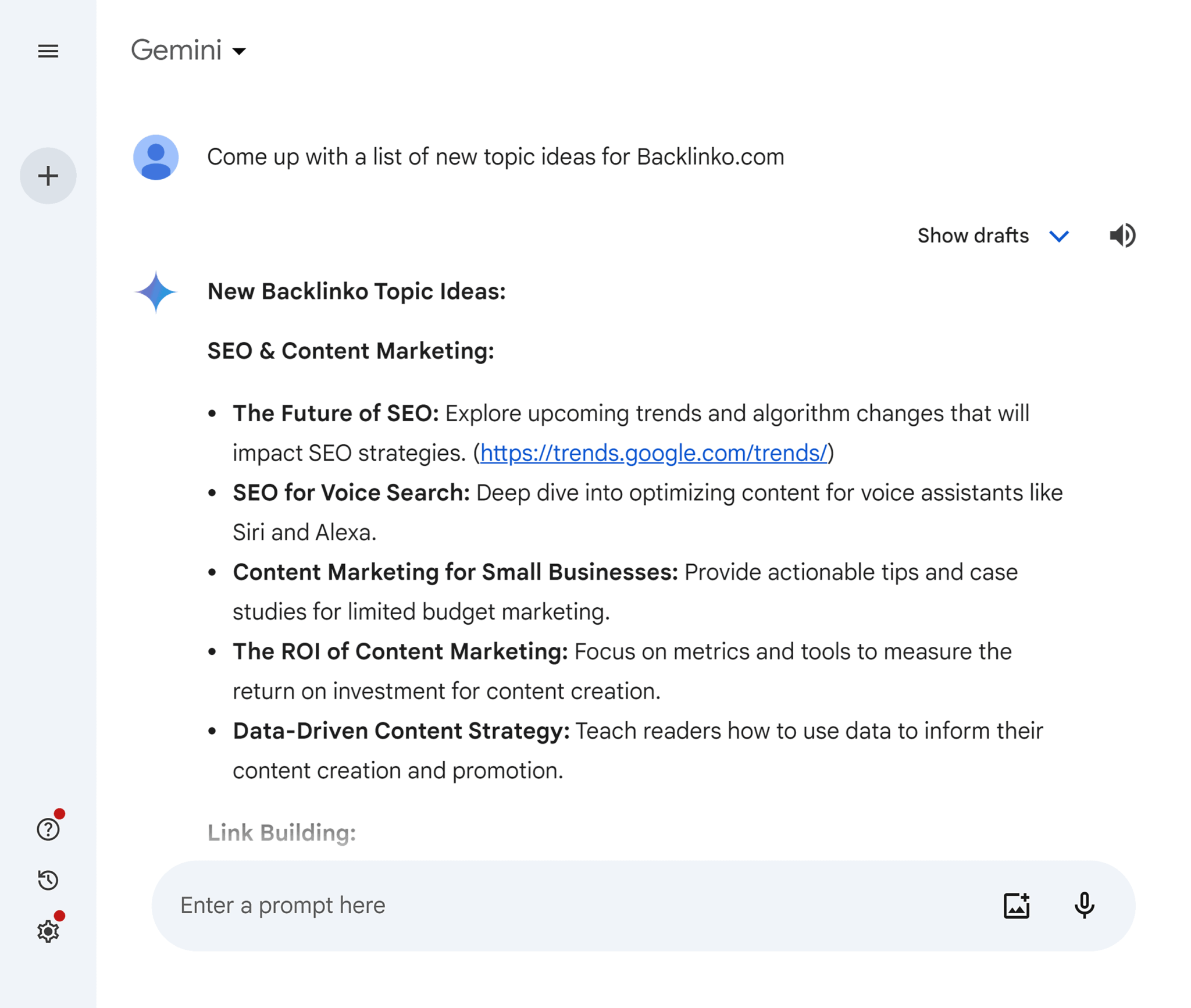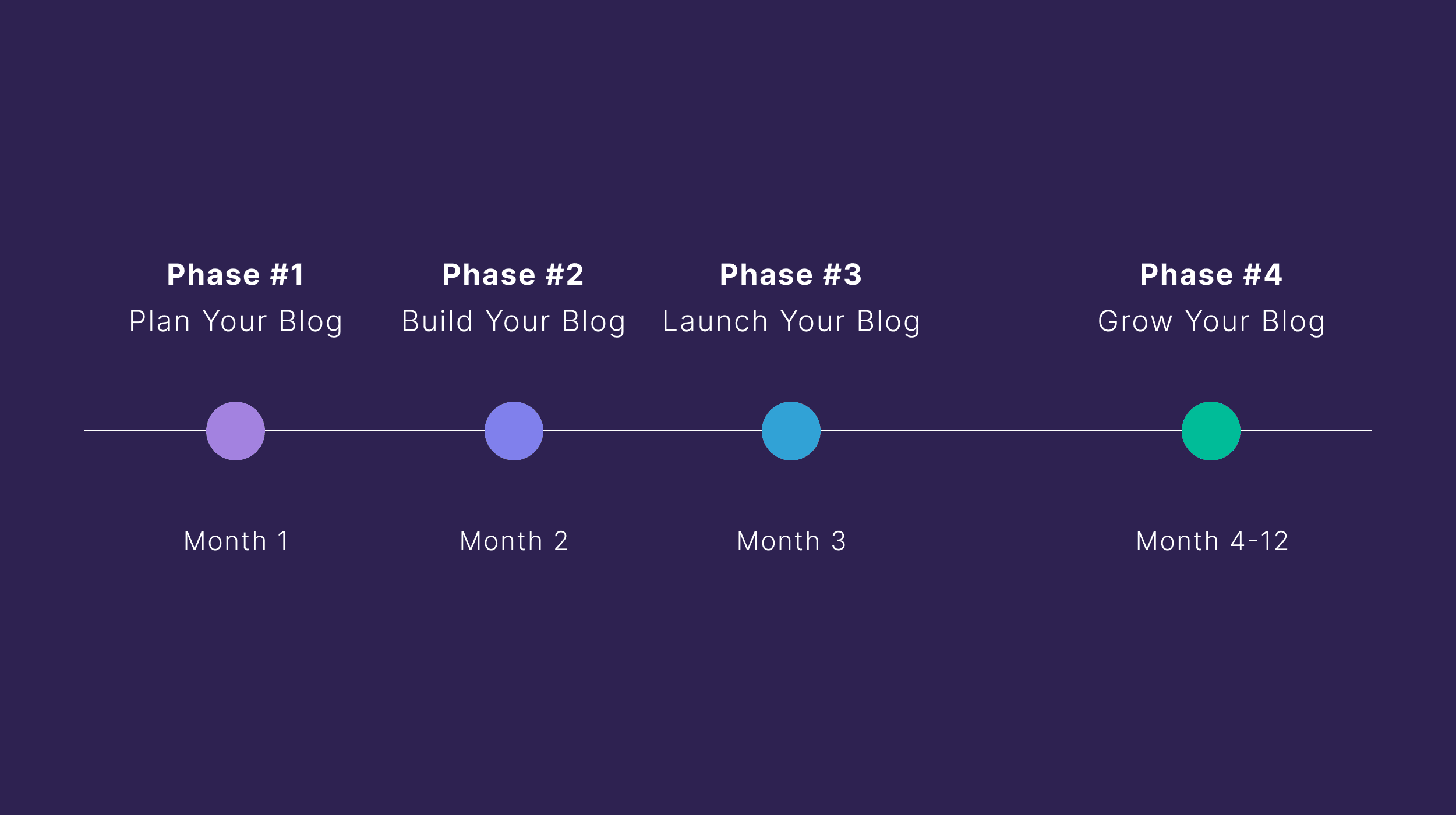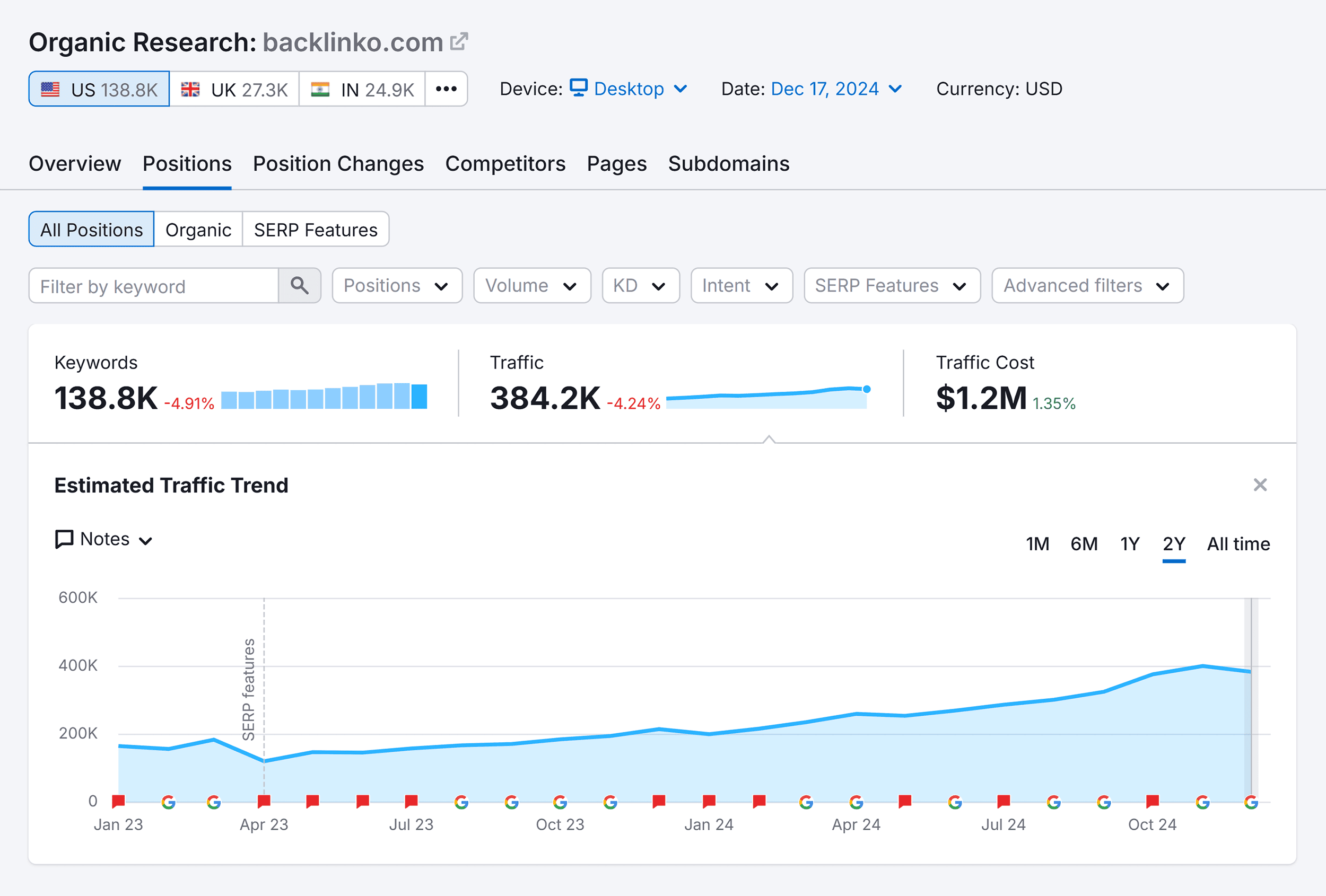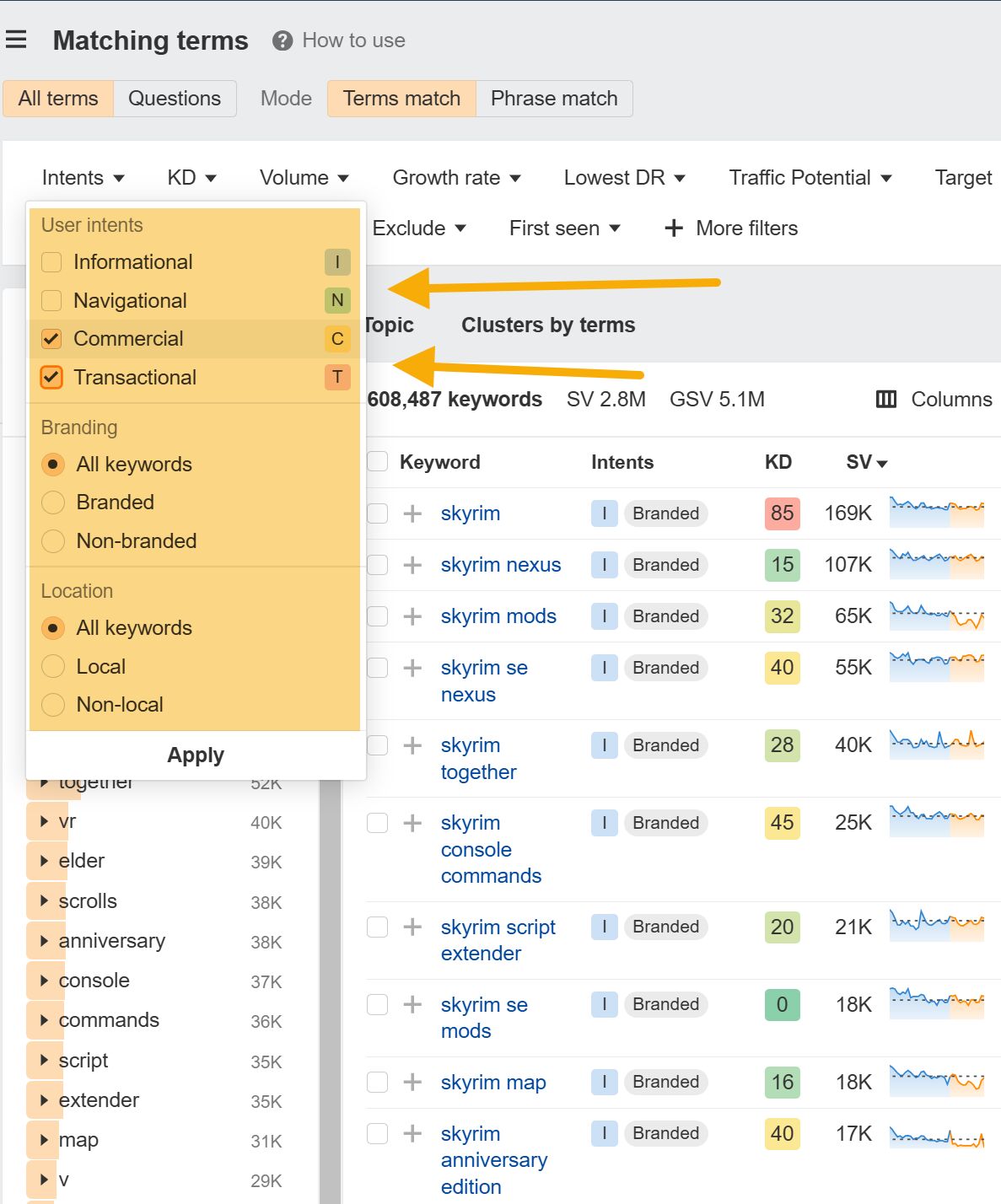ChatGPT has been a game-changer, but it’s not the only player in the AI field. The world of large language models (LLMs) is vast and varied, each offering unique features and advantages.
Whether you’re after affordability, specific functionalities, or just exploring, there’s an LLM out there for you. We’ve tested and used many of these tools, and we’re here to guide you through the best of them.
So, without further ado, let’s jump into the list of the top ChatGPT alternatives of 2024.
These are the tools that stand out in the market, each excelling in its own way.
Here’s what makes them the best in their class:
- Google Gemini (Formerly Bard): Best for problem-solving and multimodal capabilities, competing with ChatGPT.
- Semrush ContentShake AI: Best for creating high-ranking content faster.
- Microsoft Copilot: Best for Microsoft content interaction.
- Claude 3: Best for engaging in natural and extended conversations.
- GitHub Copilot: Best for software coding assistance.
- Perplexity: Best for in-depth internet research and exploration.
- Grok: Best for obtaining honest and current information.
- OpenAI Playground: Best for user-friendly customization of LLMs.
- WriteSonic: Best for developing a distinctive brand voice.
- Character.AI: Best for fun interactions with virtual characters.
- AnonChatGPT: Best for anonymous use of GPT technologies.
What to Look for in an AI Tool
Selecting the right ChatGPT alternative can be overwhelming. Here’s a simplified guide to help you choose:
- Identify your needs:
- General AI for broad use (like Gemini) or specialized AI for specific tasks (like Semrush ContentShake AI).
- Decide the AI’s main role: chatting, information gathering, creative writing, coding, design, or personalization.
- Open-source vs. closed-source:
- Open-source AI (like PyTorch): Customizable but requires technical know-how.
- Closed-source AI (like Claude): Easier to use but less flexible and potential privacy concerns.
- Cost and value:
- Pricing: Look for a fair cost-feature balance and clear pricing without hidden charges.
- Free Trials: Test the tool with a free trial or demo before buying.
- Data and computational needs:
- Large models (like GPT-4): More powerful but expensive and resource-heavy.
- Smaller models (like BERT Mini): Budget-friendly and efficient for basic tasks.
- Other considerations:
- Personalization: AI that adapts to your preferences (like PaLM 2 LLM).
- Privacy: AI with strong data protection (like Vicuna).
- Accessibility: Choose from free, freemium, or paid options to fit your budget.
Ultimately, the best AI tool for you is the one that meets your specific needs, whether for fun chats or serious business tasks.
Careful consideration of these factors will lead you to the ideal AI platform for enhancing productivity and exploring new opportunities.
The Best ChatGPT Alternatives at a Glance
| Alternative | Best for | Standout feature | Pricing | Model |
|---|---|---|---|---|
| Google Gemini (Formerly Bard) | Best for problem-solving and multimodal capabilities, competing with ChatGPT. | Integrates with Google products | Free | Gemini |
| Semrush ContentShake AI | For creating high-ranking content faster | One-click WordPress publishing | $60/mo | Proprietary |
| Microsoft Copilot | Best for interacting with your Microsoft content | Microsoft 365 integration | Free for Microsoft 365 users | Microsoft Prometheus model (A GPT-4 version) |
| Claude | Best for natural, realistic copy and conversations | 200,000 token context length | Free or $20/mo for Claude Pro | Claude 2.1 |
| GitHub Copilot | For coding and autocomplete | Integrates with Github | $10/mo for personal use | OpenAI Codex (A GPT 3.5 version) |
| Perplexity | For internet deep dives | You’ll see a list of all the sources | Free with $20/mo pro option | Perplexity Model (A GPT-3.5 version) |
| Grok | Truthful, down to earth answers | Access to real-time data | Only available to X premium subscribers | Grok |
| OpenAI playground | Tweaking an LLM in a user friendly environment | The ability to experiment with different models | Free | OpenAI’s GPT 3.5 |
| https://writesonic.com/ | It’s ability to establish a unique brand voice and reuse data with an infobase | Ability to personalize communication at scale | Free with $19/mo pro option | GPT-4 |
| Character.AI | Chatting to characters and having fun | Entertainment and fun AI conversations | Free | Character AI C1.2 |
| AnonChatGPT | Staying anonymous while using a GPT | Anonymity and a more open feel compared to OpenAI’s official site | Free | GPT 3.5 |
1. Google Gemini (formerly Bard)
Best for problem-solving and multimodal capabilities
Tool Category: Multimodal AI model
Pros:
- Advanced multimodal capabilities (plug in different files and images)
- Seamless integration with Google services (Docs, Sheets, you name it)
- Large model size, which means it’s great for complex problem-solving
Cons:
- Google’s Gemini isn’t yet as effective as GPT-4
- Lack of transparency of source data
- Premium pricing for advanced features (this is optional)
Google announced its AI model called Gemini (renamed from Bard in February 2024). It’s Google’s most powerful LLM. Unlike models such as ChatGPT, which are designed for broad conversational abilities, Gemini is purpose-built to help you be more productive.
When compared to GPT 3.5 (essentially the free version of ChatGPT), Gemini compares much more favorably in numerous tests, scoring 79.13% against GPT-3.5’s 70% in the MMLU (Massive Multitask Language Understanding) test.
It’s not just this that makes Gemini an attractive alternative. For those in the Google Mob and small business owners alike, Gemini integrates directly with Google Workspace tools that we use every day—Docs, Sheets, Slides.
This means we can call on Gemini’s AI capabilities to help draft documents, analyze data, create presentations, and more. No need to copy and paste content across apps.
While free to try, full access to Gemini will require a Google One or Google Workspace subscription. So, it may not be the most budget-friendly option. However, the deep integration with Google services we rely on makes it super appealing.
The precision of these LLMs is bound to change as this is an initial launch, but it’s one to keep on the radar if you’re a busy entrepreneur or a remote worker looking to save time, optimize workflows, and stay productive.
If you’re a developer, you might be able to get access to Gemini 1.5 Pro, giving you access to a staggering 1,000,000 token context length. So far, this dwarfs any other LLM.
Pricing:
- Freemium or Gemini Advanced $19.99/month
- Gemini Business (Google Workspace Add-on) $20/month
2. Semrush ContentShake AI
Best tool for creating high-ranking content faster
Tool Category: Content writing
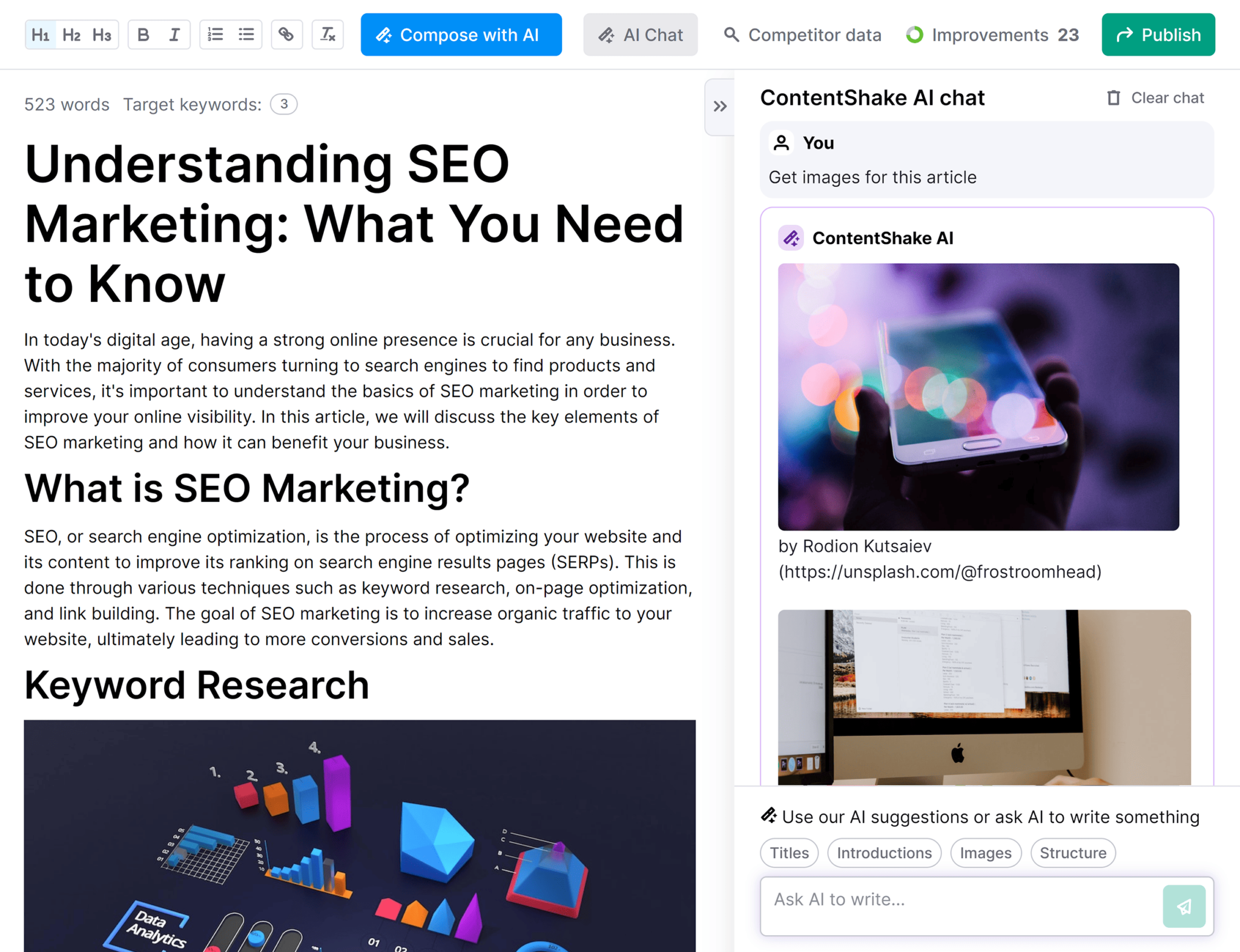
Pros:
- User-friendly interface
- Semrush keyword research data and suggestions
- Quick response times
- Competitor analysis feature
- Direct WordPress publishing
Cons:
- No option to exclude domains in competitor analysis
- Lack of integration with tools like Grammarly
- Inability to fine-tune the initial prompt
ContentShake AI impresses with its user-friendliness and fast content generation, making it a handy tool for those in need of quick, quality content. The competitor analysis feature is a standout, providing valuable insights into competitor’s images, headings, and introductions.
However, it’s not perfect. The lack of integration with popular tools like Grammarly and limited options in content management can be a bit frustrating.
Overall, though, it’s a solid choice if you need a quick draft based on keyword research, albeit with a few areas that could use some tweaking.
Pricing:
- $60/mo for unlimited articles and 25 new content ideas per week.
3. Microsoft Copilot
Best for Microsoft content interaction
Tool Category: Multimodal AI model

Pros:
- It’s integrated into Microsoft 365 apps, saving you time across products
- Great for research as it’s connected directly to Bing and provides references
- Runs on powerful GPT-4 architecture for free
Cons:
- Sometimes difficult to install into your Microsoft hub
- Only available if you sign up for Microsoft Edge or in the Bing app
- Can be really slow
Microsoft Copilot is a great alternative to ChatGPT. In short, it operates on the GPT-4 architecture and offers free access with a daily limit on prompts (beware!).
This feature makes it an excellent resource for the same types of problem-solving tasks you’d typically use ChatGPT for, delivering outputs that closely match what you would anticipate from ChatGPT.
It’s also integrated into Microsoft 365 to boost productivity. Working inside everyday apps like Word, Excel, and Outlook to help with tasks like drafting documents, analyzing data, and scheduling meetings.
It provides suggestions and assists you directly within the tools you already use. But there have been claims it can be difficult to actually get this set-up.
Despite gaining free access to GPT-4, it certainly won’t be as fast as a ChatGPT pro account. Keep this in mind.
Pricing:
- Free or Copilot Pro ($20)
4. Claude 3
Best for engaging in natural and extended conversations
Tool Category: Large language model

Pros:
- Fantastic for writing content that looks like a human wrote it
- Seems to now outcompete ChatGPT in various benchmarks
- Huge context length (great for remembering long convos)
Cons:
- The number of conversations (chats you can open) in the free version runs out pretty quick
- Sometimes isn’t as good at problem solving compared with ChatGPT
- Not as good as ChatGPT for data analysis
Claude, developed by Anthropic AI, is both an AI chatbot and the name for the underlying Large Language Models (LLMs) that run it. Claude is trained to have natural, text-based conversations, and it excels in tasks like summarization, editing, Q&A, decision-making, and more.
We’ve found that it’s great for its creativity and the tone that it adopts for writing content—which looks very similar to a human’s.
Currently, Anthropic offers a selection of models – Claude 3 Haiku, Claude 3 Sonnet, and Claude 3 Opus. Each iteration builds on the capabilities of the last, edging closer to human-level comprehension.
The maximum token length for Claude is a staggering 200,000 tokens, which is approximately equivalent to 150,000 words.
Remember that the average book is around 75,000 words long, so this means that you could theoretically paste in a whole book and prompt to your heart’s content.
It’s not just books though, it allows users to analyze and perform tasks on lengthy excerpts of code, documents, and more.
Pricing:
- Pro Version: $20 per month
5. Github Copilot
Best for software coding assistance
Tool Category: LLM for coding
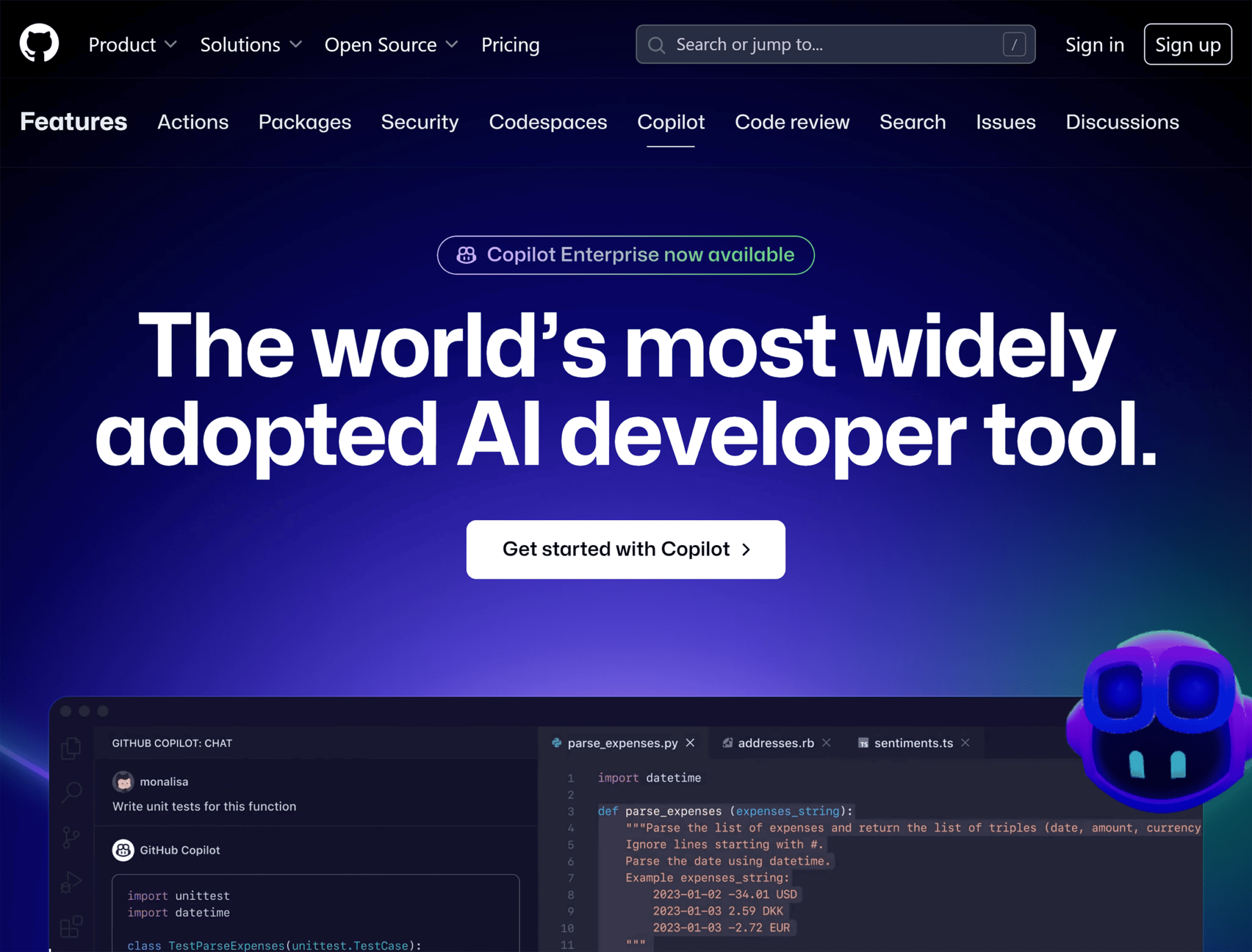
Pros:
- It’s multi-lingual
- Great learning tool for beginner coders
- Reduces the number of coding errors you make
Cons:
- There’s a risk coders become too reliant on it and don’t create their own code-bases
- Sometimes, it hallucinates and gives you the wrong code
- There are privacy and data concerns with sharing your code
GitHub Copilot, developed by GitHub in collaboration with OpenAI, is an AI-powered code completion tool that assists developers in writing code.
The idea is that as you’re coding, Copilot will suggest relevant code snippets in context based on things like your comments, variable names, and overall code structure. It aims to save developers time and reduce bugs by handling rote coding tasks.
Built on OpenAI’s powerful GPT-4 language model, Copilot has an impressive comprehension of code structure and patterns across dozens of programming languages. It’s capable of suggesting completions for whole functions or classes after just a few lines.
Of course, being AI-generated means it’s not perfect—occasionally suggesting overly long or outdated snippets. But the GitHub team is confident Copilot can continue training and improving. It’s certainly taken the developer market by storm.
However, as a code model, it doesn’t work for conversational chats like ChatGPT.
Pricing:
- Pro Version: $10 per month
6. Perplexity AI
Best for in-depth internet research and exploration
Tool Category: AI Search Engine

Pros:
- Accurate and exhaustive search responses when compared to typical search engines like Google
- You’ll see a list of all the sources
- Free to use and has an app
Cons:
- As a predictive search model it can still hallucinate
- Not great for content generation or problem solving
- Not multimodal like Gemini, Copilot, and ChatGPT
Perplexity AI was created by Aravind Srinivas, Denis Yarats, Johnny Ho, and Andy Konwinski—scientists known for their work on large language models like GPT-3 (OpenAI). They designed Perplexity as a search and answer engine that relies on AI to provide reliable responses to user queries.
It uses natural language processing to understand questions posed in everyday language. Then, it searches the internet and draws from its own knowledge base to provide conversational answers that are typically very accurate.
One of the key advantages of Perplexity AI over other LLM’s is its accuracy. Say if you’re writing a content piece or an essay, it’s the perfect assistant for you to fact-check sources and validate any hypotheses that you might have.
What makes it different from Multimodal models like ChatGPT is that it’s pretty damn good at search, but not great at complex problem-solving or content generation. So choose wisely.
There’s no question that it will improve over time, particularly with the recent investment of $74 million from Nvidia. This significant boost is setting the company on a trajectory to compete with search engines at large. One to watch!
Pricing:
- Pro Version: $20 per month or $200 per year
7. Grok
Best for obtaining honest and current information
Tool Category: Conversational Chatbot

Pros:
- It has a unique character, being both sarcastic and rebellious
- Real time data access from X (formerly Twitter)
- Strong creative writing ability
Cons:
- Access to Grok requires an X Premium membership
- Since it’s trained on data from X it’s questionable how factually correct the data it’s trained on is
- Has the potential to be offensive
Initially called “TruthGPT”, Elon Musk’s Grok AI, a product of his xAI startup, is an AI chatbot that’s growing in interest due to its unique take on the typical LLM.
Grok is designed to interact with users in a playful and sometimes rebellious manner, aligning with Elon Musk’s vision for the model to challenge ‘woke’ culture.
Critics argue that Grok’s reliability is questionable at best, given that its training data comes from X (previously known as Twitter), which includes tweets and thread data not verified for accuracy.
The key benefit of Grok comes from its access to X’s latest data, making it a really useful chatbot for inquiries about current events.
Worth taking this one with a pinch of salt.
It is currently under beta testing for those with the premium version of X.
Pricing:
- X Premium Version: $16 per month
8. OpenAI Playground
Best for user-friendly customization of LLMs
Tool Category: Multimodal AI model
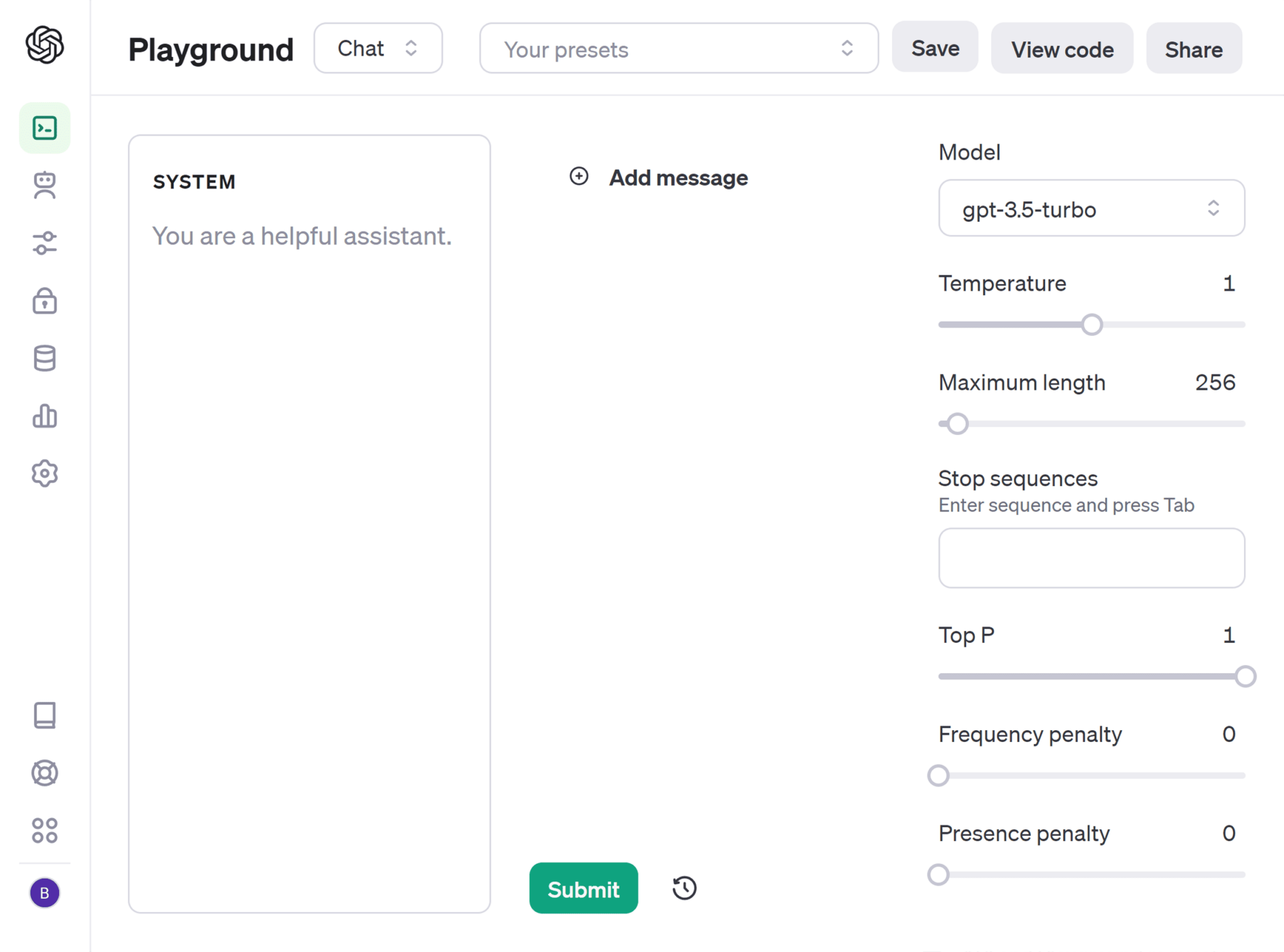
Pros:
- Sandbox environment is great for experimenting
- Very customizable, with options to adjust variables like randomness and length
- View code option, to easily copy the parameters for a prompt
Cons:
- No free option is available for continued use
- A little more technical than ChatGPT
- Requires some knowledge of coding to fully utilize the tool
OpenAI has pulled another sneaky one on us. They released their own alternative to ChatGPT: OpenAI Playground.
OpenAI Playground is a website that lets you easily test and experiment with OpenAI’s latest AI models, like GPT-3.5 and GPT-4. It’s similar to ChatGPT but more customizable—you can tweak parameters and compare different models.
So if you want to see how GPT-3.5 responds to a prompt versus GPT-4, OpenAI Playground makes it easy. It’s a great tool for playing around with generative AI, even though it relies on the same models that power ChatGPT. The main difference is the interface and level of control you have over testing.
Overall, OpenAI Playground and ChatGPT share the same DNA, however, the Playground is definitely geared more toward developers who want fine-tuned control to test OpenAI’s tech.
Pricing:
- $5 in free credits to use before you need to upgrade (mind that you can’t use GPT-4 in the free mode)
- For Premium, you need to pay for Playground tokens. For GPT-4 (8K) and GPT-4 (32K) contexts, the prompt prices are $0.03/1k tokens and $0.06/1k tokens, respectively.
9. WriteSonic
Best for developing a distinctive brand voice
Tool Category: Marketing and copywriting chatbot
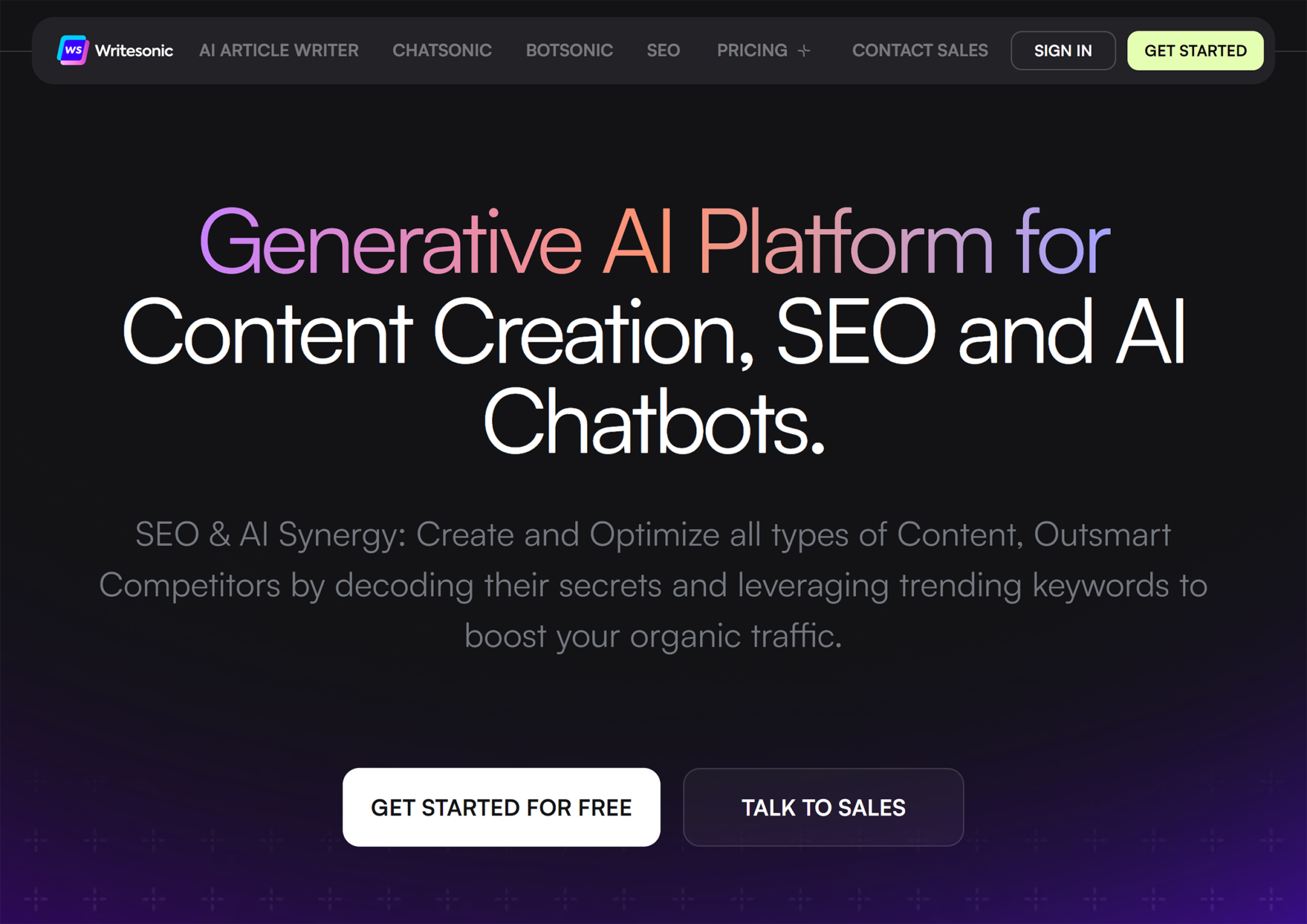
Pros:
- It holds your brand data so you don’t have to repeat prompts
- You can use writing templates
- Great for high-quality long-form content (1,500 words or more)
Cons:
- Your pricing plan is based on the number of words Writesonic will generate for you each month
- They have 100 or so content templates, you might not find any that are relevant to your use-case
- It’s still AI written content and won’t pass all plagiarism tests
Writesonic is an AI writing tool specialized for marketing and business content. It has templates and features to easily create things like ad copy, product descriptions, emails, blog posts, and more.
It’s not as advanced as ChatGPT for complex problem-solving, but it’s great for rapidly generating all kinds of written content.
The catch is that the different pricing tiers limit how many words you can generate per month. So you need to keep an eye on your word count usage if you produce a lot of content.
Pricing:
- Free, $13 Small Team, $500 Enterprise
10. Character.AI
Best for fun interactions with virtual characters
Tool Category: LLM Entertainment
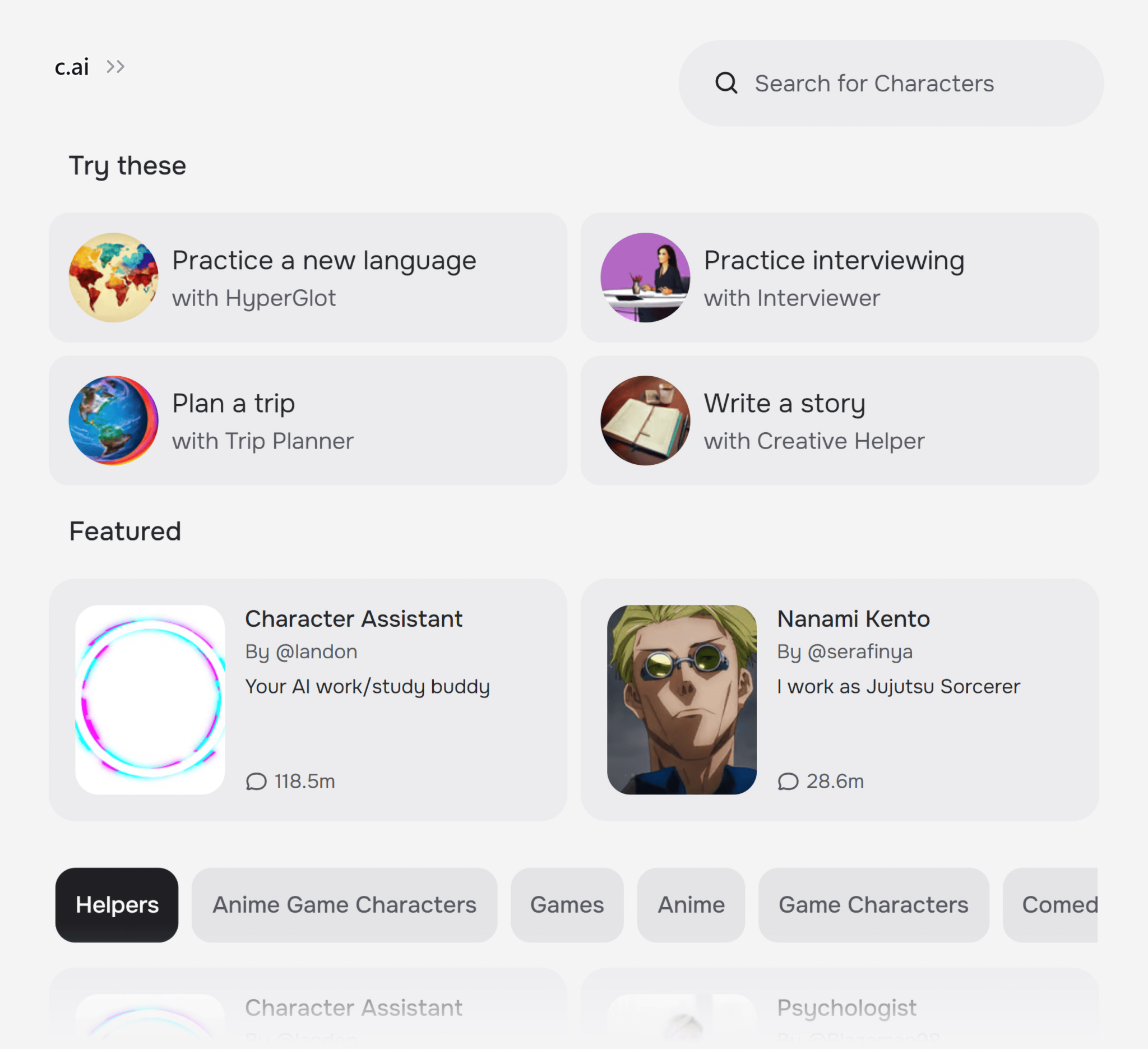
Pros:
- You can chat to thousands of different real life characters
- Great for showing the family what LLM’s can do
- No ads or card payment process needed
Cons:
- Conversations can get repetitive
- Limited real world practicality
- It’s not a productivity tool or problem solver
Character.AI is a chatbot service that creates AI companions you can have natural conversations with. It offers “characters” with their own personalities that can talk to you just like a real person.
For example, you can chat with a simulated celebrity like Elon Musk, fictional character like Harry Potter, or even an AI assistant personalized for you. Character.AI aims to make conversations feel really human and responsive.
So in basic terms, it provides AI friends to chat with about anything. The characters are customized to speak in their own voices and remember details about you. Unlike a standard chatbot, Character.AI focuses on lifelike back-and-forth conversations.
Whereas ChatGPT is also a large-scale conversational AI bot, its purpose lies more in providing informative output rather than entertainment.
Pricing:
- Free and Premium ($9.99)
11. AnonChatGPT
Best for anonymous use of GPT technologies
Tool Category: Anonymous Large Language Model
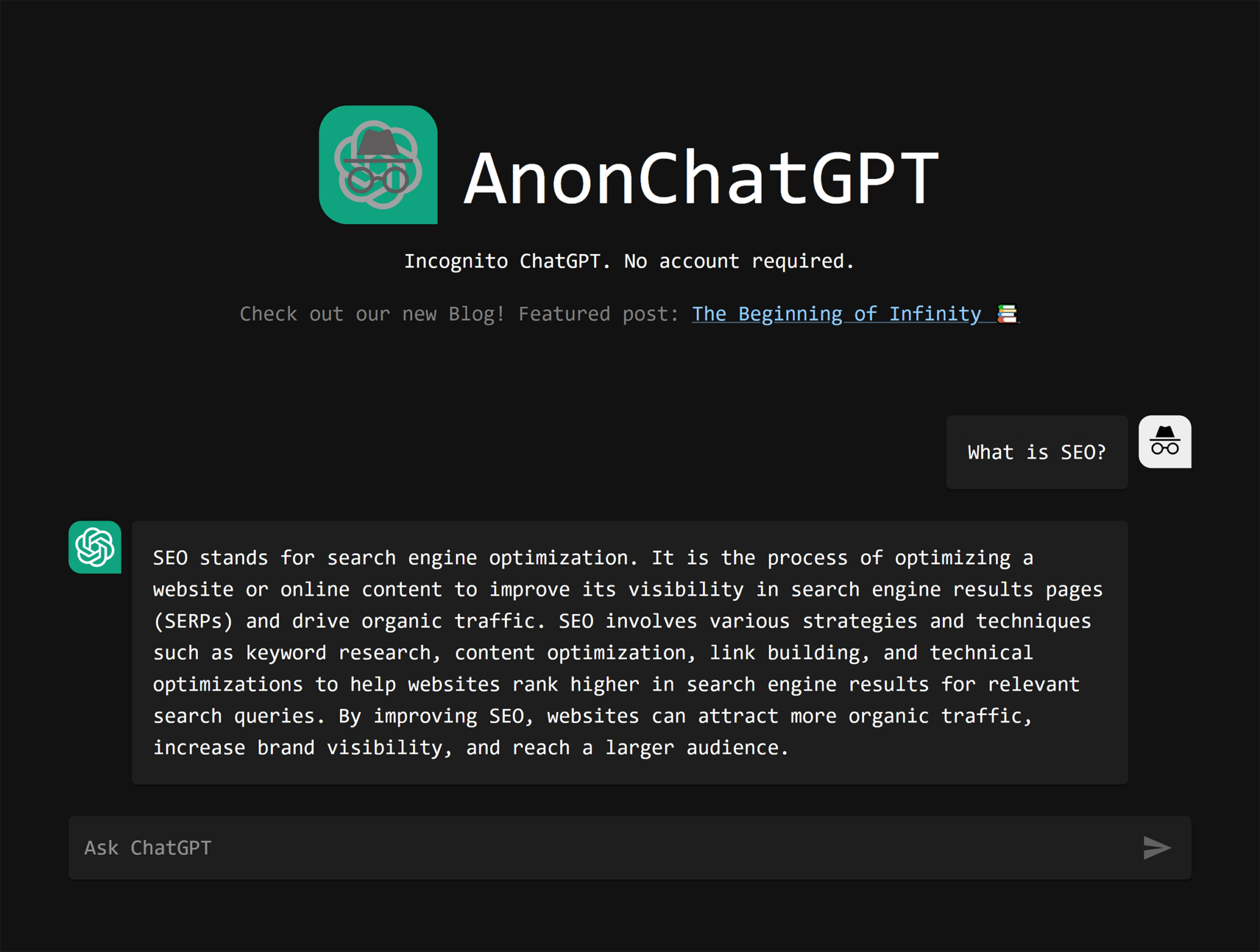
Pros:
- No need to share your private data
- Not bad for anonymous coding
- No ads or card payment process needed
Cons:
- Hidden character and word limit
- It uses GPT 3 which is far less powerful than GPT 4
- It’s not multimodal
AnonChatGPT is an anonymous AI chatbot that doesn’t require signing up or providing any personal information before chatting.
The chatbot is powered by OpenAI’s GPT-3 so it’s a little behind the rest of the models, but if you’re looking for a secure alternative, this could definitely be the model for you.
A defining feature of AnonChatGPT is the emphasis on user privacy. Chats are not logged, stored or shared by the service. Users can also chat anonymously with others who are online.
The goal is to create an open environment for AI conversations without collecting personal data.
Pricing:
ChatGPT Alternatives That Didn’t Make the List
- Llama 2: A super efficient model built by the Meta team that’s valued for it’s open source framework
- YouChat: A perplexity alternative, best for doing deep dives on the internet with referenced articles
- HuggingChat: Created by the GenAI hosting company HuggingFace, best for choosing multiple different LLM options at once
- QuoraPoe: Not actually an LLM itself, it’s a hub where you can choose multiple chatbots such as ChatGPT, Claude, Sage and DragonFly and switch between them super easily
- Socratic: Built by Google, it’s best for helping you with any research or educational work
- Khanmigo: Built by the Khan Academy it’s definitely the best for learning
- Amazon CodeWhisperer: Another great option built by Amazon for coding autocompletion
- Pi: Built by Inflection AI, best for minimalist personal use (has a great UI)
Choose the Best ChatGPT Alternative for Your Use Case
Nailing down the single “best” ChatGPT alternative isn’t really possible since there are so many different LLMs in the market built for such a wide range of purposes.
Picking the right product for your needs will depend on factors like your budget, your organization’s size, and the tool’s ability to work with your specific use-case.
The variety of available large language models (LLMs) can make choosing one seem super overwhelming. However, it might be beneficial to focus on mastering one particular LLM that seems most suitable for your needs.
If you’re still unsure which to choose, consider exploring how ChatGPT can be leveraged for specific applications, such as search engine optimization (SEO).
By understanding its application in SEO, you may discover valuable insights on how to effectively utilize ChatGPT or a similar LLM for your unique requirements.
Content Copyrights Belong to The Author. All Rights Reserved.
We're A Dallas Digital Marketing Agency That is Experts At Social Media Marketing, Website Design and Emarketing and Promotion.

